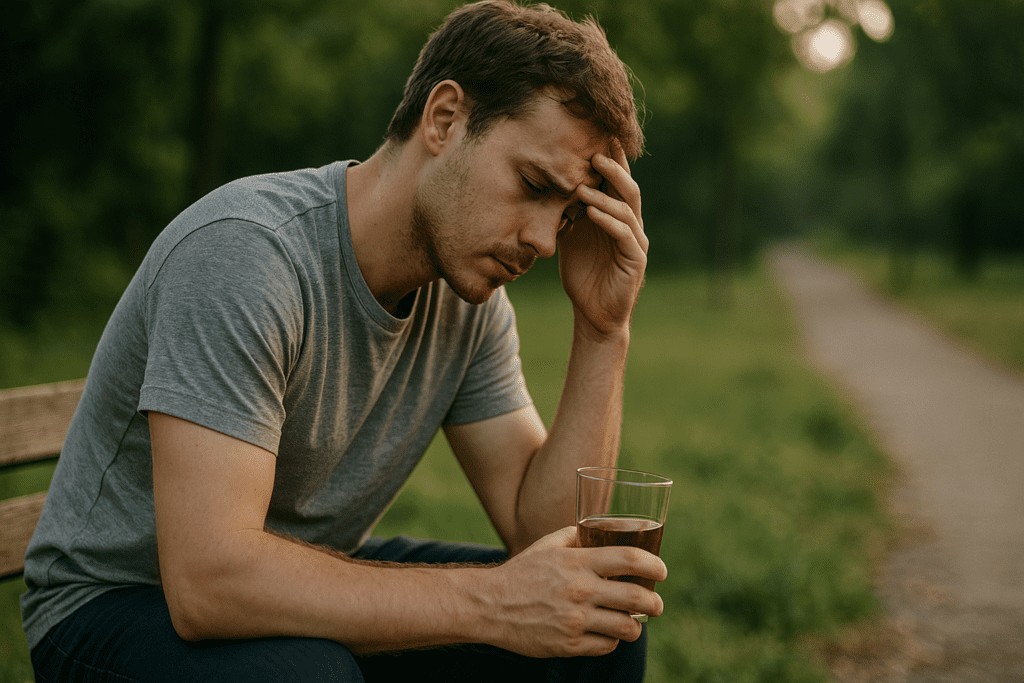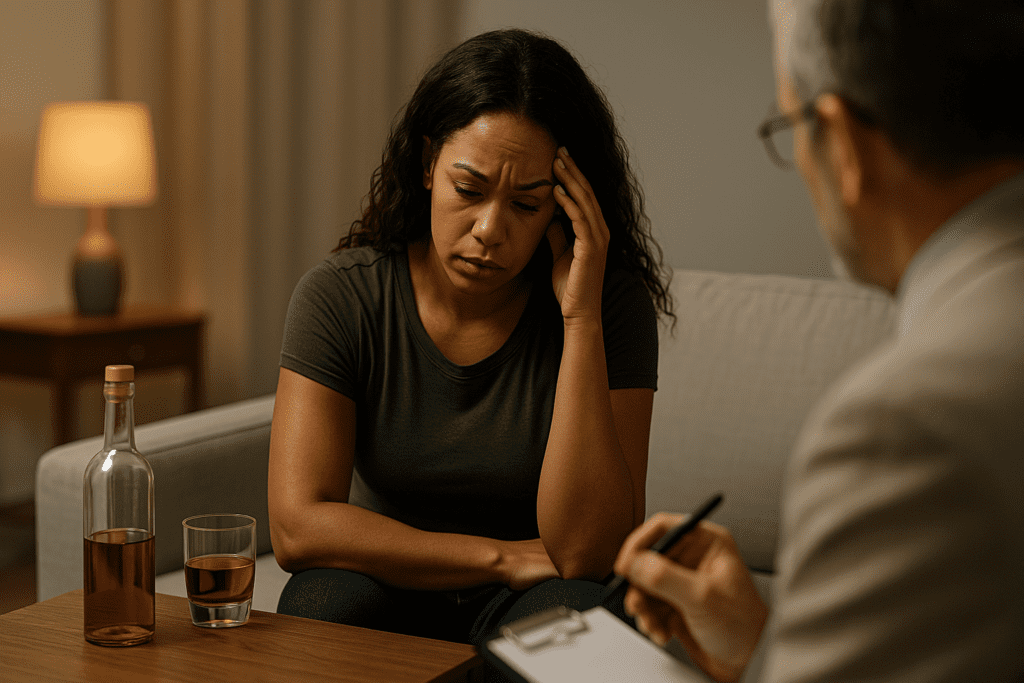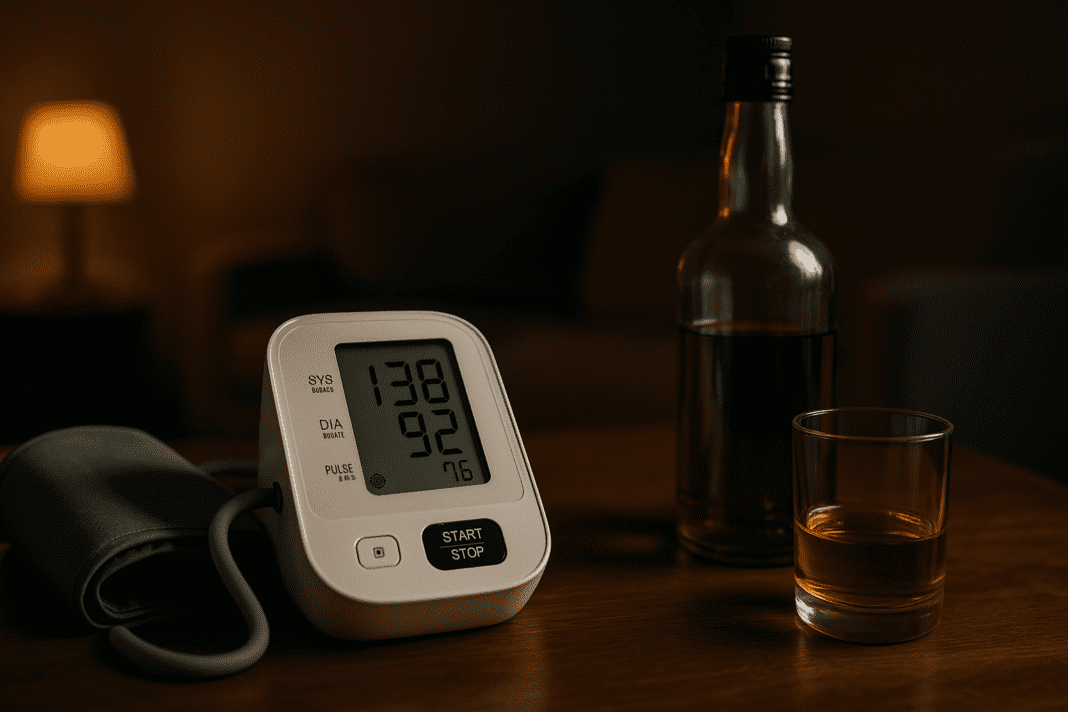The intricate relationship between alcohol consumption and cardiovascular health has long fascinated both the medical community and the public. As global rates of hypertension continue to rise, so too does interest in understanding modifiable lifestyle factors that can influence blood pressure regulation. Among the most debated of these is alcohol. Can alcohol raise blood pressure? The answer is far from simple. While moderate drinking has been associated with certain protective cardiovascular effects in specific populations, the overall picture becomes far more concerning when the frequency, quantity, and type of alcohol consumed are taken into account. For individuals with existing hypertension, or those at risk of developing it, understanding how alcohol affects blood pressure is not just useful—it’s potentially lifesaving.
You may also like: Sudden Spikes in Blood Pressure: What Can Cause a Sudden Increase and When to Seek Medical Attention
Alcohol and High Blood Pressure: The Complex Interplay
Alcohol’s effects on blood pressure are both immediate and long-term. In the short term, alcohol can cause a temporary increase in blood pressure, particularly within a few hours of consumption. For some, this effect may be negligible, especially if drinking is infrequent and in small amounts. However, consistent intake, even at moderate levels, has been shown to elevate blood pressure over time. This is particularly true for individuals with other risk factors such as obesity, sedentary lifestyle, or a family history of hypertension.
Researchers have found that alcohol and high blood pressure are closely connected through several physiological mechanisms. One such mechanism is the activation of the sympathetic nervous system, which can cause blood vessels to constrict, leading to higher blood pressure. Additionally, alcohol can interfere with the baroreceptors in the heart and blood vessels, which are responsible for detecting changes in blood pressure and helping to maintain homeostasis. When these sensors are dulled or misfiring due to frequent alcohol exposure, the body’s ability to regulate blood pressure diminishes.
Does Alcohol Raise Your Blood Pressure Temporarily and Chronically?
It’s important to differentiate between acute and chronic effects when asking, “Does alcohol raise your blood pressure?” In acute cases, a single episode of heavy drinking can lead to a noticeable spike in blood pressure. This is due to the aforementioned activation of stress responses in the body. Over time, if such behavior becomes habitual, these temporary spikes can contribute to a sustained elevation in baseline blood pressure levels.
Chronic alcohol use alters hormone levels, particularly those involved in blood pressure regulation such as renin, aldosterone, and cortisol. These hormonal imbalances can lead to persistent hypertension, even in individuals who might not otherwise be predisposed. Thus, while occasional social drinking might not be dangerous for everyone, the cumulative effect of consistent alcohol intake can quietly erode cardiovascular health over time.

Can You Drink Alcohol with High Blood Pressure Without Worsening the Condition?
This is a question many individuals with hypertension find themselves asking. Can you drink alcohol with high blood pressure and still maintain health stability? The answer depends on several factors including the type of alcohol, the amount consumed, and the individual’s overall health profile. Light to moderate alcohol intake—defined as up to one drink per day for women and up to two for men—might not significantly harm blood pressure levels for some. However, even within these limits, some people may experience adverse effects.
For individuals already on antihypertensive medications, drinking can further complicate treatment. Alcohol can interact with these drugs in unpredictable ways, potentially diminishing their effectiveness or amplifying their side effects. For instance, certain calcium channel blockers may cause dizziness when combined with alcohol. This interaction underscores the importance of consulting a healthcare provider before incorporating alcohol into a lifestyle that also includes blood pressure management.
Can Alcohol Increase Blood Pressure More Depending on the Type of Drink?
The type of alcohol consumed can influence its impact on blood pressure, though research on this is still evolving. When comparing the best and worst alcohol for high blood pressure, some findings suggest that beverages with high alcohol content—such as spirits and liquors—may exert a stronger effect on raising blood pressure than lower-alcohol options like wine or beer. This is especially relevant in cases of binge drinking or when liquor is consumed in large quantities.
Does liquor cause high blood pressure more frequently than beer or wine? It appears so, largely because liquor is often consumed in ways that result in higher blood alcohol concentrations more rapidly. That said, drinking patterns matter greatly. Even beer, which is lower in alcohol content, can raise blood pressure if consumed in excess. Thus, it’s not just the type of alcohol but also the frequency, volume, and context of consumption that contribute to cardiovascular outcomes.
Best and Worst Alcohol for High Blood Pressure: What the Research Suggests
Among the available choices, red wine in moderation is sometimes cited as the best alcohol for high blood pressure due to its content of polyphenols such as resveratrol, which may have vasodilatory and antioxidant properties. However, these potential benefits are quickly outweighed by risks if wine is consumed in excess. On the other end of the spectrum, distilled spirits—such as vodka, whiskey, and rum—are often considered the worst alcohol for high blood pressure, especially when consumed rapidly or without food.
It’s worth emphasizing that the designation of “best” or “worst” alcohol is relative and contingent on moderation. No form of alcohol can be considered safe for blood pressure if consumed irresponsibly. Moreover, individual responses can vary based on genetics, pre-existing conditions, and concurrent lifestyle factors, making it essential to approach any conclusions with nuance.
Does Drinking Alcohol Cause High Blood Pressure in Otherwise Healthy Individuals?
For people who are otherwise in good health, the question arises: does drinking alcohol cause high blood pressure if all other metrics are within normal range? Surprisingly, the answer may still be yes. Studies have demonstrated that even in individuals with no prior history of hypertension, regular alcohol consumption can increase the likelihood of developing the condition. The threshold for this effect appears to vary, but generally, higher levels of consumption correlate with greater risk.
What makes this particularly insidious is that high blood pressure often presents with no overt symptoms. A person may feel perfectly fine while their vascular system is gradually deteriorating due to the cumulative effects of alcohol. This underscores the importance of regular monitoring and lifestyle evaluations even among those who perceive themselves as healthy.

Does Drinking Affect Blood Pressure Differently Between Men and Women?
Sex-based differences in alcohol metabolism and cardiovascular physiology suggest that the effects of drinking on blood pressure may vary between men and women. Generally, women metabolize alcohol more slowly than men and may experience its blood pressure-raising effects at lower doses. Hormonal factors, particularly estrogen levels, also influence vascular function and may interact with alcohol metabolism in complex ways.
Epidemiological studies have indicated that women who consume moderate to heavy amounts of alcohol are more likely than men to experience an increase in blood pressure. This heightened sensitivity means that recommendations for safe alcohol consumption may need to be even more conservative for women, particularly those with other cardiovascular risk factors or who are postmenopausal.
Can Beer Raise Blood Pressure, and If So, How?
While often viewed as a more benign option due to its lower alcohol content, beer is not without its risks when it comes to blood pressure. Can beer raise blood pressure significantly? The answer, unfortunately, is yes—especially when consumed in excess. Beer is frequently consumed in larger volumes than wine or spirits, leading to a higher overall intake of alcohol and, in many cases, sodium, depending on the brand and processing methods.
Beer also tends to be consumed in social contexts that encourage prolonged drinking, such as sporting events or parties. This setting can lead to repeated elevations in blood pressure, particularly in individuals with existing cardiovascular concerns. Furthermore, beer is often accompanied by high-sodium snacks such as chips or pretzels, compounding its potential to increase blood pressure.
Can Drinking Cause High Blood Pressure in Younger Adults?
Hypertension is not solely a condition of the elderly. Increasingly, younger adults are being diagnosed with high blood pressure, often in association with lifestyle factors such as poor diet, lack of exercise, and alcohol consumption. Can drinking cause high blood pressure in people in their 20s or 30s? Absolutely. The earlier someone begins drinking heavily, the more time there is for chronic changes in blood pressure regulation to take hold.
In young adults, the risk is often underestimated, both by the individual and by healthcare providers. Symptoms may be absent or misattributed to stress or lack of sleep. Over time, these missed signals can culminate in more serious cardiovascular events, such as stroke or heart attack, particularly if high blood pressure remains undiagnosed and untreated. Prevention and early intervention, including limiting alcohol consumption, are crucial.
Can Alcohol Affect Blood Pressure Through Indirect Mechanisms?
Beyond direct physiological effects, alcohol can influence blood pressure through indirect pathways as well. Sleep disruption is one notable example. Alcohol interferes with REM sleep and can contribute to conditions such as obstructive sleep apnea, both of which are linked to increased blood pressure. Similarly, alcohol can exacerbate anxiety and depression—mental health conditions that themselves have associations with higher blood pressure.
Another indirect mechanism involves weight gain. Alcoholic beverages are calorie-dense and can contribute to excess caloric intake without providing nutritional benefits. Over time, this can lead to obesity, which is one of the strongest predictors of hypertension. For individuals struggling to manage their weight, alcohol reduction or abstinence may be a vital part of comprehensive blood pressure control.
Does Drinking Alcohol Raise Your Blood Pressure Even If You Exercise Regularly?
It might seem logical to assume that the cardiovascular benefits of regular exercise would counterbalance the risks associated with drinking. However, the reality is more complicated. Does drinking alcohol raise your blood pressure even if you maintain an active lifestyle? Studies suggest that it can. While exercise is a powerful tool for maintaining cardiovascular health, it does not completely negate the impact of alcohol on the body’s regulatory systems.
Moreover, some individuals use alcohol as a post-exercise reward or to unwind after intense physical activity, potentially undermining the benefits they have gained. The synergistic effect of combining alcohol with exercise-induced dehydration or electrolyte imbalance can further stress the cardiovascular system. Thus, while fitness is protective, it is not a free pass to drink indiscriminately.

Frequently Asked Questions: Alcohol and High Blood Pressure
1. How does long-term alcohol use affect blood vessel elasticity and blood pressure regulation?
Over time, chronic alcohol consumption can lead to vascular remodeling, where the structure of blood vessels becomes more rigid and less responsive to changes in blood flow. This loss of elasticity means the arteries cannot dilate as effectively, contributing to sustained increases in blood pressure. When asking, “Does alcohol raise your blood pressure in the long run?” this stiffening effect is a critical piece of the puzzle. The more alcohol someone consumes regularly, the more likely their blood vessels are to experience oxidative stress and inflammation, accelerating vascular aging. While exercise and dietary changes can help counteract some of this damage, the impact of drinking and high blood pressure over decades can be irreversible in many cases.
2. Can moderate alcohol consumption still affect nighttime blood pressure levels and sleep cycles?
Yes, even small amounts of alcohol can disturb sleep quality, which in turn affects nighttime blood pressure control. The body relies on restorative sleep to maintain normal circadian blood pressure rhythms, but alcohol can suppress REM sleep and cause nighttime awakenings. This disruption can elevate blood pressure during sleep and reduce the body’s ability to recover from daytime cardiovascular stress. So, even if someone doesn’t experience daytime hypertension, the answer to “Does drinking affect blood pressure while sleeping?” is often yes. These hidden nighttime elevations may go undetected without 24-hour ambulatory monitoring but can still contribute to long-term cardiovascular risks.
3. Are there psychological factors that influence how alcohol and high blood pressure are related?
Absolutely. People who consume alcohol as a coping mechanism for stress, anxiety, or depression may experience compounded blood pressure problems. Chronic stress already activates the sympathetic nervous system and raises cortisol levels, which can independently elevate blood pressure. When combined with alcohol—a known depressant that can interfere with emotional regulation—the psychological burden increases cardiovascular strain. In this context, asking “Can alcohol affect blood pressure through mental health pathways?” opens a nuanced discussion. Mental health treatment, such as cognitive behavioral therapy, may be a more effective long-term strategy for stress relief than relying on alcohol.
4. Can the timing of alcohol intake influence its impact on blood pressure levels?
Yes, the time of day when alcohol is consumed can alter its cardiovascular impact. Drinking in the evening may coincide with meals and slower metabolism during sleep, exacerbating nighttime blood pressure surges. In contrast, alcohol consumed earlier in the day may be metabolized more efficiently but still contributes to cumulative blood pressure load. The question “Can alcohol raise blood pressure more at night than during the day?” is relevant, especially for people experiencing nocturnal hypertension. Health experts recommend avoiding alcohol within three hours of bedtime to minimize both sleep disruption and nighttime blood pressure spikes.
5. Is it possible to reduce the risks of alcohol-induced hypertension without completely abstaining from alcohol?
For some individuals, reducing frequency and volume—rather than quitting entirely—can lead to measurable improvements. Cutting back to one or two drinks per week and staying hydrated may minimize the risk that drinking alcohol will raise your blood pressure. Additionally, choosing the best alcohol for high blood pressure—such as dry red wine in modest quantities—can be less harmful than opting for the worst alcohol for high blood pressure, like high-proof liquors. However, for those already diagnosed with hypertension, moderation must be defined more stringently. Behavioral strategies such as alcohol-free days and accountability check-ins can aid in long-term harm reduction.
6. How does alcohol interact with sodium levels in the body to influence blood pressure?
Alcohol can increase sodium retention by altering kidney function and triggering the release of hormones like vasopressin. This means that when people drink—especially with salty snacks or meals—their body is more likely to hold onto sodium, which directly elevates blood pressure. This interaction may explain why people wonder, “Does drinking alcohol cause high blood pressure even if my diet seems fine?” The combination of alcohol and hidden sodium sources (like processed bar foods) creates a perfect storm for hypertensive episodes. Monitoring sodium intake becomes even more critical when alcohol is part of the lifestyle equation.
7. Are certain demographics more vulnerable to alcohol-induced high blood pressure?
Yes, genetic predisposition, age, race, and underlying medical conditions all influence how alcohol affects blood pressure. For instance, African Americans are more likely to develop salt-sensitive hypertension, and this susceptibility can be amplified by alcohol use. Women, due to differences in alcohol metabolism and hormonal fluctuations, may also be more sensitive to even moderate drinking. When people ask, “Can drinking cause high blood pressure in everyone equally?” the answer is no. Healthcare providers must consider individualized factors when offering guidance on alcohol consumption and cardiovascular risk.
8. How does alcohol withdrawal affect blood pressure in habitual drinkers?
Paradoxically, abruptly stopping alcohol—especially in heavy drinkers—can cause a temporary spike in blood pressure due to withdrawal-induced sympathetic overactivity. This rebound effect often leads people to mistakenly believe that reducing alcohol is making their condition worse. In reality, this is a short-term phenomenon and does not negate the long-term benefits of quitting or cutting back. When wondering, “Can alcohol increase blood pressure even when you stop drinking?” it’s essential to differentiate between temporary withdrawal responses and sustainable health outcomes. Medical supervision during withdrawal may be necessary to stabilize cardiovascular function safely.
9. Do non-alcoholic alternatives impact blood pressure in the same way as traditional alcohol?
Most non-alcoholic beers and wines contain trace amounts of alcohol but typically not enough to significantly influence blood pressure in healthy individuals. However, these beverages often contain added sugars and sodium, which can still be problematic for people with hypertension. So while switching to alcohol-free versions may help reduce overall alcohol load, the question “Can beer raise blood pressure if it’s non-alcoholic?” depends on the brand’s nutritional content. Consumers should read labels carefully and prioritize options with minimal additives to avoid inadvertently raising their blood pressure through other means.
10. How might future research shift our understanding of alcohol and high blood pressure?
Emerging studies are exploring the role of gut microbiota, genetic markers, and epigenetic modifications in determining how alcohol affects blood pressure. These innovations may one day allow personalized predictions about which individuals are more likely to develop hypertension in response to specific types of alcohol. Researchers are also investigating whether certain medications or nutraceuticals could buffer the cardiovascular effects of drinking. The evolving question is not just “Does liquor cause high blood pressure?” but rather, “Who is most at risk, and can we predict or mitigate that risk?” Precision medicine may soon offer more tailored recommendations for managing drinking and high blood pressure in diverse populations.
Conclusion: Understanding the Risks of Drinking and High Blood Pressure
The relationship between drinking and high blood pressure is nuanced, multifaceted, and deeply influenced by individual behaviors, health status, and genetic predisposition. While occasional alcohol consumption may not be harmful to everyone, the evidence clearly shows that regular or excessive intake can lead to significant increases in blood pressure over time. Whether considering the effects of beer, wine, or liquor, the verdict is consistent: alcohol, in all its forms, has the potential to elevate blood pressure and contribute to long-term cardiovascular risk.
For individuals wondering, “Can alcohol raise blood pressure?” or “Does drinking alcohol cause high blood pressure even if I feel fine?”—the answer is increasingly clear. The physiological pathways through which alcohol operates are well documented, and the outcomes, though sometimes subtle, are cumulative. In determining the best alcohol for high blood pressure or trying to avoid the worst alcohol for high blood pressure, the most prudent course is moderation, informed by medical advice and regular monitoring. Limiting alcohol intake is a proactive step toward safeguarding cardiovascular health. As more research continues to refine our understanding, one truth remains: managing high blood pressure requires not just medical treatment, but also mindful lifestyle choices—of which alcohol consumption is a major part.
hypertension and alcohol consumption, cardiovascular effects of alcohol, alcohol’s impact on heart health, managing blood pressure naturally, lifestyle factors and hypertension, alcohol-related heart risks, high blood pressure prevention tips, cardiovascular health strategies, blood pressure and dietary habits, alcohol metabolism and vascular health, alcohol use and medication interaction, blood pressure monitoring tips, vascular damage from alcohol, long-term effects of drinking, heart-friendly lifestyle choices, alcohol and endocrine system, alcohol’s role in chronic disease, risk factors for hypertension, blood pressure and stress management, alcohol and kidney function
Further Reading:
Alcohol: Does it affect blood pressure?
Effect of alcohol on blood pressure
Limiting Alcohol to Manage High Blood Pressure
Disclaimer
The information contained in this article is provided for general informational purposes only and is not intended to serve as medical, legal, or professional advice. While MedNewsPedia strives to present accurate, up-to-date, and reliable content, no warranty or guarantee, expressed or implied, is made regarding the completeness, accuracy, or adequacy of the information provided. Readers are strongly advised to seek the guidance of a qualified healthcare provider or other relevant professionals before acting on any information contained in this article. MedNewsPedia, its authors, editors, and contributors expressly disclaim any liability for any damages, losses, or consequences arising directly or indirectly from the use, interpretation, or reliance on any information presented herein. The views and opinions expressed in this article are those of the author(s) and do not necessarily reflect the official policies or positions of MedNewsPedia.


